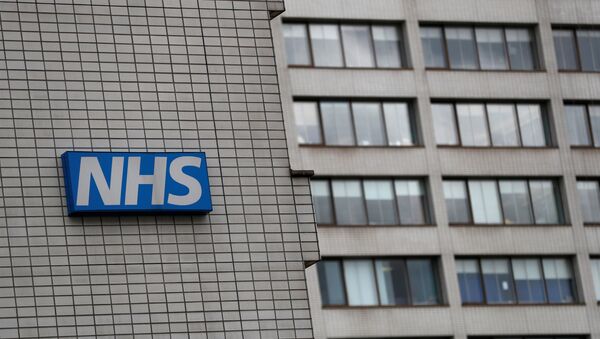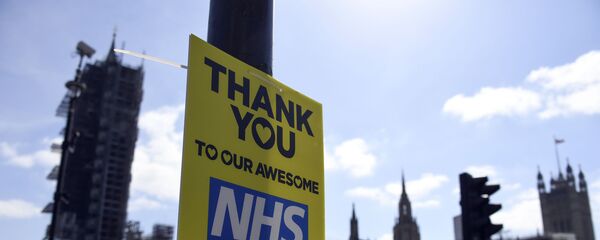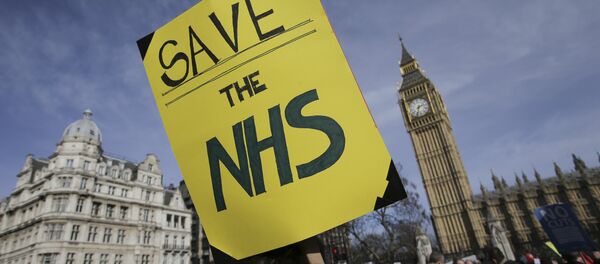Ellen Lees, Campaigns Officer at the We Own It Group, says that if the bill is not amended, the UK will not be able to protect the UK's National Health Service from being included in future trade agreements.
Sputnik: Can you tell us a bit more about this new bill regarding the NHS?
Ellen Lees: So the bill is actually the trade bill - it's not specifically about the NHS - it allows the government to negotiate and pass trade deals. The Tories have always argued that this is a continuity bill, which means that it allows them to pass into law, trade agreements that we already had as part of our relationship with the EU. But the fact is that we don't have any other legislation that covers negotiating or passing trade agreements and so new deals such as the one with the US, there's no regulation, there's no laws that tell the government how to do those negotiations, and so we've been pushing for the last few months to amend the trade bill to say various things including the NHS will never be on the table in a trade negotiation. Unfortunately, on Monday, it was passed through the (House of ) Commons without being amended in that way, which means that there are no legal protections for NHS in trade negotiations. So now we're relying on the House of Lords to amend the bill to protect NHS.
Sputnik: What does this bill specifically mean for the UK if these amendments aren't made? How will this bill essentially change health care provision for British citizens right across the country?
Ellen Lees: Well, if there's no legal protections for the NHS in the bill, that means that we're relying on the promises of Boris Johnson, and the negotiating skills of our trade negotiators to keep the NHS off the table. In some trade agreements, I'm sure they might manage to do that, and it depends how much you trust Boris Johnson's promises. But I know that I'm not particularly confident that, particularly with the US and also with other countries, that we'll be able to protect all of our health services from being included in trade agreements. What that means is that it means different things depending on what gets into the trade agreement but some trade deals include something called Investor State Dispute Settlement (ISDS), which is a corporate court system where private companies are able to sue governments that they're in a trading relationship with if that government changes the law in a way that affects their ability to make profit.
If a US company has invested in our NHS and providing services and our NHS, as some already are, an ISDS clause in a trade agreement between the UK and the US means that those US companies can sue the UK Government if the UK Government changes the law to say we don't want private companies, or you're not allowed to charge that much for this service, or I'm going to restrict the way that you provide that service. It just means that our government is sort of beholden to the power of corporations who want to make money out of our public services, and that applies to public services outside the NHS as well.
Sputnik: What options still remain on the table to perhaps improve the security of the NHS as these trade negotiations continue with the US? Moreover, what can individuals do to ensure that their voices are heard on this issue?
Ellen Lees: As I said the bill will now go to the House of Lords at some time in the autumn and we launched a petition yesterday to the House of Lords to ask them to step up and protect our NHS by amending the bill in the ways that we've asked. 40,000 people have signed that in less than 24 hours so there's a lot of momentum and a lot of anger building around the way that MPs have failed us in failing to protect the NHS. If anyone listening wants to find that petition you can find that on our website, weownit.org.uk, and we will be continuing to push the House of Lords to amend the bill right up until that passes back into the Commons.
If the trade bill is not amended that's not the end of the line as well, because the NHS is such a precious thing to everyone in this country, and I know that people will continue to fight for it right until the very end. There are ways that we can resist individual trade deals being negotiated that might affect our NHS like the way that the public rose up and resisted TTIP a couple of years ago. If trade deals are negotiated that are not in the interest of people, I'm sure that people will do something about that. So resisting individual trade deals is also possible but obviously amending the trade bill would just mean that we wouldn't need to have that conversation after or before every trade deal is negotiated.



